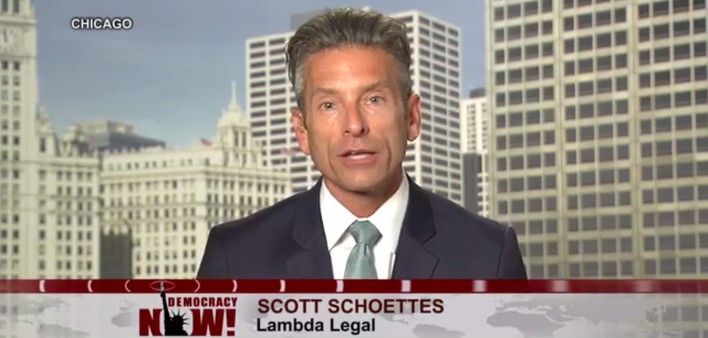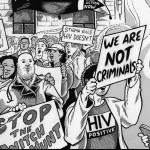On June 16, six members of the Presidential Advisory Council on HIV/AIDS (PACHA), including three who are living with HIV, resigned from the organization, citing concerns about how the Trump administration is failing to address the epidemic.
Scott Schoettes, HIV project director at Lambda Legal, is one of the three members of PACHA living with HIV who has stepped down from the council.
“As advocates for people living with HIV, we have dedicated our lives to combating this disease and no longer feel we can do so effectively within the confines of an advisory body to a president who simply does not care,” wrote Schoettes in a Newsweek op-ed.
Since 1995, PACHA has worked closely with the secretary of health and human services to provide advice, information and recommendations about programs, policies and research to promote effective treatment, prevention and an HIV cure. The council is appointed by the president and includes researchers, public health officials, HIV advocates and people living with HIV. Under the Obama administration, PACHA helped develop and implement the first-ever National HIV/AIDS Strategy.
According to Schoettes, Trump lacks knowledge and concern about HIV, which, he wrote, was apparent during his presidential candidacy. Evidence backs Shchoettes’s claims. During the primaries, while both Hillary Clinton and Bernie Sanders met with HIV advocates, Trump refused. And when President Trump took office, he shut down the Office of National AIDS Policy’s website, which has yet to be replaced, and has neglected to appoint someone to lead the White House Office of National AIDS Policy.
“While these actions and others are gravely worrisome to us as HIV advocates, the final straw for us—more like a two-by-four than a straw—is President Trump’s handling of health care reform,” Schoettes wrote.
As POZ previously reported, the Trump administration attempted to repeal the Affordable Care Act (aka Obamacare), a bill that has helped millions of people living with HIV, and replace it with the American Health Care Act (AHCA). Under the AHCA, people living with preexisting conditions, such as HIV or hepatitis C, would be charged higher premiums. Furthermore, the AHCA would no longer require insurance plans to cover essential health benefits, which provide the services that help people living with HIV stay healthy. While the original version of the AHCA failed to pass, the GOP continues to work to replace the Affordable Care Act with its own plan. In fact, Senate Republicans hope to vote on their bill before Congress breaks for its July 4 recess.
Positive Women’s Network–USA (PWN–USA) member Grissel Granados, who is living with HIV, shared her decision to resign from the organization in a PWN press release:
“I have decided to step down from PACHA because I do not feel that the current administration would take any of the recommendations made by the advisory council. Any of the recommendations I have to make a real impact on the rates of HIV as well as the quality of life for people living with HIV, which are based on science and community best practices, are in opposition to anything the administration stands for. There is no point in me being part of PACHA if the administration will not support comprehensive sexual health education in schools, continue expanded Medicaid, or make spaces safe for undocumented immigrants. The current administration has threatened the rights, safety, and wellbeing of the populations most impacted by the HIV epidemic, including women of color, gay men of color, and youth.”
In the same press statement, PWN member Gina Brown, who is also HIV positive, added, “I’m resigning from PACHA because it’s clear this administration doesn’t care about the needs of women with HIV. I’m taking the fight for our lives back to the streets.”
What does this mean for PACHA moving forward? The group’s future is uncertain, but Schoettes assures the HIV community that the former members will continue their work from the outside.
“We hope the members of Congress who have the power to affect health care reform will engage with us and other advocates in a way that the Trump Administration apparently will not,” Schoettes wrote.
Click here to read more about the American Health Care Act, and watch the video below to see Schoettes’s interview with Democracy Now!







1 Comment
1 Comment